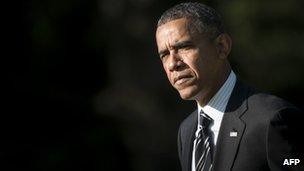Obama's thick red line on Syria
- Published
- comments

The US president is reticent to intervene, and there is little domestic pressure to do so.
A year ago President Barack Obama gave a speech saying that if the Assad regime used chemical weapons, that would cross a red line and change his calculations.
Has that red line now been crossed?
The simple answer is that we don't yet know.
While a White House spokesman, Josh Earnest, has said the US is "appalled" by "horrifying" reports from Syria, it doesn't seem Mr Obama is inclined to pronounce.
Mr Earnest called on the Assad government to co-operate with the UN inspectors in full.
But asked if reporters would hear from the president while he is on a bus tour about lowering the cost of higher education, he said, "as we're weighing these domestic policy decisions, and as we're weighing these foreign policy decisions, the president puts the interest of the United States of America first.
"And I think the fact that we are doing this bus tour is an indication that the president has his priorities straight"
I think that means no, the president does not want to talk about Syria.
We've lost another opportunity to find out more about the administration's approach.
The president's main military adviser has cancelled a planned news conference. Chairman of the Joint Chiefs of Staff Gen Martin Dempsey, external was due to answer questions at the foreign press centre.
Perhaps he's had to call it off because he is busy planning what happens next in Syria.
Perhaps not.
'Many sides'
He seemed pretty clear in a recent letter to a congressman that military action was undesirable.
"Syria today is not about choosing between two sides but rather about choosing one among many sides," Gen Dempsey said.
"It is my belief that the side we choose must be ready to promote their interests and ours when the balance shifts in their favour. Today, they are not.''
But President Obama clearly has a problem, and will be accused of inaction and dithering.
Senator John McCain says Mr Obama blurred his own red lines earlier in the summer by not responding militarily to reports of attacks and so encouraged this latest incident.
Sen McCain has just issued another statement:
"Our friends and enemies alike, both in the Middle East and across the world, are questioning whether America has the will and the capacity to do what it says.
"This dangerous development impacts the national security interests of the United States and our closest allies, and if we continue to sit by passively while Assad continues to use chemical weapons against his own people, we only provide encouragement to other brutal governments in their use of harsh measures against their own people.
"It is time for the United States to come to the assistance of the Syrian people."
No American outrage
Our own Middle East editor Jeremy Bowen is forthright that this is a critical moment and Iran will be watching careful to see if Mr Obama sticks to his threat of military action.
But my strong feeling is that Mr Obama will not rush to action.
His whole philosophy warns him against intervention in the Middle East. Domestic politics suggest Americans don't want to get involved.
Getting embroiled would rather undermine his boast to be the president who brought the troops home.
Then there is Gen Dempsey's point - whom would the West support if it did take action, and would that further its overall interests?
There may be a tipping point when moral outrage grows too strong.
I would again caution that while that may be the mood in the UK and France, it is not here. The fears on Capitol Hill are not reflecting any sense of fury in America.
I am certain there are plans for the discreet use of special forces to secure chemical weapons - but it is not clear what the trigger would be.
In either case, Mr Obama is likely to insist on going the full UN route to gather the maximum possible support for any action - and that means waiting for the inspector's report on earlier incidents at the very least.
I could be very wrong. The bombers could be in the air by this afternoon.
But at the moment all Mr Obama plans for today is a talk about the cost of college education and "a better deal for the middle classes".
I suspect his red line is very thick indeed.